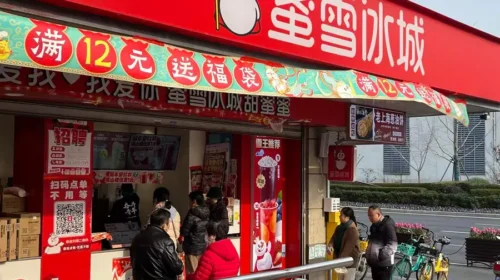The leading milk tea chain will pay $40 million for 51% of Fulujia, one of the country’s leading operators of stores selling beer-based drinks
Key Takeaways:
- Mixue will pay 285.6 million yuan for a majority stake of a major beer drink store operator, as it expands beyond the crowded bubble tea sector
- The acquired company, Fulujia, is controlled by the wife of Mixue’s CEO, but the two sides appear to have negotiated a fair price for the purchase
By Doug Young
As milk tea makers rapidly lose their sparkle in an increasingly saturated market, sector leader Mixue Group (2097.HK) thinks it’s found the answer to its next growth phase in a different drink. The company, known for its cheap milk teas and ice cream costing around 6 yuan to 10 yuan per serving, is hopping onto the beer wagon in its search for new pastures, it announced last week, marking its first major acquisition since its blockbuster IPO in March.
Mixue said it will pay 285.6 million yuan ($40 million) for 51% of Fulujia (Zhengzhou) Enterprise Management Co. Ltd., operator of a chain of about 1,200 stores around China selling beer for about 6 yuan to 10 yuan per 500 ml cup. Mixue said it will pay for the purchase using its own resources, which include its huge cash pile of more than 17 billion yuan at the end of June, a big chunk of which came from its listing that raised $444 million.
The purchase looks like quite a good fit for Mixue, complementing its core offerings of milk teas, ice cream and coffee, by adding another drink targeting slightly older adults, namely beer drinkers. The acquired company sells its products under the Fulu brand name, at price points that are quite similar to Mixue’s. Fulujia also uses a franchise model similar to Mixue’s, which has allowed the latter to boost its current footprint to more than 53,000 stores in China and 12 global markets.
It’s not difficult to see why Mixue and Fulujia have such similar business philosophies, since their top executives are husband and wife. In this case, the mastermind behind Mixue is its CEO Zhang Hongfu, while Fulujia is controlled by his wife, Tian Haixia. Before Mixue’s purchase, Tian held about 76% of Fulujia through her 60% direct share ownership and her 80% ownership of Mailing Tongzhou, which holds another 20% of Fulujia.
Such a highly connected transaction will inevitably attract strong scrutiny from investors worried about the potential for a sweetheart deal for Tian Haixia. But a close look at the numbers appears to show the couple has made a real effort to fairly value Fulujia, which we’ll describe shortly. And the deal also looks quite sensible from a strategic perspective.
That situation was largely reflected in shareholder reaction to the news, which saw Mixue’s stock rise 2.7% last Thursday, the day after the announcement, only to give back those gains the next day. Easy come, easy go. But the lack of major negative reaction shows investors weren’t too concerned, nor were they extremely excited, probably due to Fulujia’s relatively small size compared to its larger acquirer.
Mixue’s stock has nearly doubled since its IPO, giving it a market-leading price-to-earnings (P/E) ratio of 25. By comparison, rivals Chagee (CHA.US), Chabaidao (2555.HK) and Guming (1364.HK) trade at lower multiples of 23, 20 and 19, respectively, while the smaller Auntea Jenny (2589.HK) trades higher at 32.
All the companies are likely to come under pressure over the next year due to increasing saturation in their home China market. Analysts also expect the group’s sales growth to slow sharply going into the end of this year as takeout delivery companies slash heavy subsidies that were charging up bubble tea sales. The takeout delivery subsidies date back to earlier this year when e-commerce giant JD.com entered the market.
Fairly valued
Next, we’ll take a closer look at some of Fulujia’s business metrics that show it’s far smaller than Mixue, but also relatively well positioned for strong potential growth. For starters, Fulujia has far fewer rivals than Mixue, since China’s market for beer chains is far less developed than for milk teas and coffee products.
Mixue hasn’t given any industry figures for China’s beer market, specifically for beer stores like the ones that Fulujia operates. But it’s probably fair to say that with 1,200 outlets, Fulujia is one of the biggest, if not the biggest, operator of such stores. In addition to traditional beers, the company also offers a range of related products, including fruit beer, and such “made in China” specialties as tea beer and even milk beer, according to the announcement.
In the last 12 months, Fulujia recorded revenue of about 150 million yuan, or just a tiny fraction – about 1/200th – of Mixue’s 29 billion yuan for the 12 months through June. That’s roughly in line with the purchase price that values Fulujia at about 571 million yuan, or about 1/230th of Mixue’s latest market value of HK$143 billion.
Fulujia became profitable last year, swinging to a modest profit of 1.07 million yuan from a 1.53 million yuan loss in 2023. Neither of those figures is very big, and Mixue points out that since the company’s profits are still quite unstable it’s better to use Fulujia’s sales to gage the company’s value. From that perspective, the purchase price represents a price-to-sales (P/S) ratio of about 3.45, which is relatively high but behind Mixue’s own 4.56 ratio.
While we’re always slightly skeptical of companies that have just become profitable, since such profitability could be the result of creative accounting, the sales-based valuation metrics seem to show Mixue has tried to negotiate a fair price for Fulujia and isn’t paying a big premium due to the husband-wife relationship between the two companies’ chiefs.
And from a strategic perspective, the deal really does seem to make a lot of sense, which Mixue points out several times in its announcement. It noted the deal will help it “grow into more globally influential food and beverage brand” and will also boost Fulujia by giving it access to Mixue’s vast supply and logistic chains and bulk purchasing power.
“Following this investment, the group’s product portfolio will extend beyond freshly-made fruit drinks, tea drinks, ice cream, and coffee to include fresh beer, further meeting consumers’ common demands for high-quality products with value for money and advancing the group’s mission to enable everyone around the world to enjoy high-quality delicious products with value for money,” Mixue said.
While we’re not sure if the world is ready for milk and tea beers, we would tend to agree the addition of beer-based drinks should certainly help Mixue expand into some new niches, both in terms of products and customer demographics. And given Mixue’s vast resources, we wouldn’t be surprised to see a major expansion ahead for Fulujia as its beer business enters a new growth phase.
To subscribe to Bamboo Works weekly free newsletter, click here







